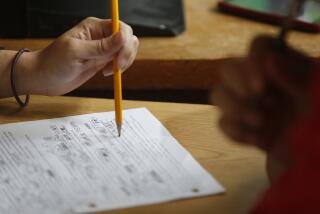How to Take an Intelligent Approach to Final Exams
- Share via
Area students don’t have much longer to wait before reaching the beloved prize for completing yet another year of school: summer vacation.
But before you start shopping for an ice chest or tanning oil, you’ve got to complete a last round of exams or projects. Most area junior high and high school students will battle these in the next two to four weeks.
Start preparing for them now.
Although some teachers are trading the usual two-hour final exam for an evaluation based on a project or exhibition, most still use the traditional exam format or give some kind of shorter test.
The first step in preparing for any final exam is to find out when the teacher will hold a review session. These are the closest you can come to seeing the actual test because teachers tell you which concepts, chapters, people or other information to focus on.
If your teacher has not mentioned a review session, ask for one. Enough requests might prompt him or her to think twice.
Make sure you take careful notes at the review session, and bring a list of questions you’ve jotted down. Studying concepts you just don’t understand gets you nowhere.
Next, start skimming through your entire semester (or specified term) of notes, assignments and tests, highlighting with a colored pen any details you feel you need to study further.
Do about an hour’s worth of this every school day. You may have heard stories of students who don’t touch their books or notes until the night before the exam, then study up for hours and perform brilliantly the next day. That may work--but for very few people.
The truth is that you’re much more likely to understand and remember information that you tackle piece by piece over time rather than in a frantic all-nighter.
Besides studying the material covered in class, try to use at least one supplemental source.
For example, ask your teacher if there are videotapes, magazines, PBS documentaries or local museum displays that relate to subjects covered in your upcoming exam.
An exam answer that includes references to outside study is particularly impressive. It shows that you have some initiative and went beyond the assignments.
One of my most successful techniques in high school and college was “playing teacher” by devising exam questions of my own.
Writing your own exam provides an invaluable overview of the course. It also helps you to recognize which concepts are most important and what types of questions are likely to be asked about them (true/false, multiple choice, short answer, essay, etc.).
Write test questions and answers for the entire range of knowledge that your teacher’s exam will cover.
Don’t be surprised if your teacher’s exam contains questions very similar to the version that you create beforehand.
Studying with a friend is a great idea, particularly for quizzing each other with questions you’ve composed based on the exams, as long as you choose a partner whose performance in the class is at least equal to yours. Otherwise you may spend the time improving your partner’s test score rather than your own.
In fact, it’s best to have a study partner who knows the subject better than you do, so you can ask questions of him or her.
No matter how much time you spend studying in the coming weeks, knock off early on the night before the big exam. Again, bear in mind that last-minute cramming does little good anyway.
Instead, start the mind-and-body phase of preparing for the test.
First, assemble all the materials you’ll need for the next day, such as pens, pencils, paper, dictionary and calculator. That way you won’t surprise yourself unpleasantly as you start your test the next day.
Set your clothes and other belongings out too. Choosing your wardrobe ahead of time can mean the difference between being on time or being late for your exam. Being late can mean missing important instructions, advice or even extra-credit opportunities related to the exam. Some teachers won’t repeat the information for latecomers.
A special word about the clothes you select for exam day: I have no scientific research to offer, but I have heard repeatedly from my students that wearing their favorite outfits helps boost their confidence and concentration for exams.
Once you’ve organized the morning routine, get to bed early. Eight hours of sleep is a good goal before big exams.
Breakfast is always crucial, but especially on exam day. Skip the doughnuts and soft drinks that seem to be customary for a lot of students. The sugar may provide an energy burst, but then it “drops” you quickly and dramatically. Stick with carbohydrates (bread, bagels, low-sugar muffins) and some fruit for a more steady and effective source of energy.
Find your desk early, sit down and set up your materials. That way there will be time to ask your teacher last-minute questions or hit the restroom before the test starts.
Don’t study at the last minute--it might just confuse you.
Instead, spend the last pre-exam minutes relaxing your mind and body so that the information can flow smoothly when it’s finally needed.
Nothing beats taking a few long, deep breaths, then holding each a few seconds before letting them out slowly.
With each breath, picture yourself doing well on the exam. Smile (at least to yourself, if you’re afraid of looking silly to others) and silently say, “I’m ready to do well” or some similarly encouraging phrase.
Of course, even the most careful study may not produce a perfect exam performance.
No matter how you try to anticipate the scope and format of the test, you may still encounter some questions that will prompt the age-old question on exam day:
“Where did that one come from?”





